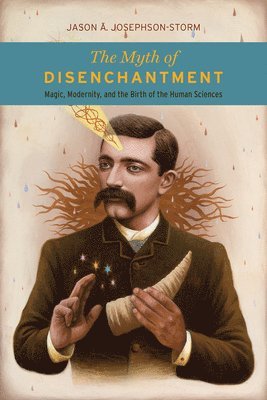
- Format
- Häftad (Paperback / softback)
- Språk
- Engelska
- Antal sidor
- 400
- Utgivningsdatum
- 2017-05-16
- Förlag
- University of Chicago Press
- Illustratör/Fotograf
- 5 figures
- Illustrationer
- 5 figures
- Dimensioner
- 226 x 152 x 28 mm
- Vikt
- Antal komponenter
- 1
- ISBN
- 9780226403366
- 613 g
The Myth of Disenchantment
Magic, Modernity, and the Birth of the Human Sciences
- Skickas från oss inom 5-8 vardagar.
- Fri frakt över 249 kr för privatkunder i Sverige.
Passar bra ihop
De som köpt den här boken har ofta också köpt The Courage To Be Disliked av Ichiro Kishimi, Fumitake Koga (häftad).
Köp båda 2 för 492 krKundrecensioner
Fler böcker av Jason Ananda Josephson Storm
-
Metamodernism
Jason Ananda Josephson Storm
For decades, scholars have been calling into question the universality of disciplinary objects and categories. The coherence of defined autonomous categoriessuch as religion, science, and arthas collapsed under the weight of postmodern critiques, ...
Recensioner i media
"A superb book. The kind that turns your brain upside down and gives it a good shake."-- "Peter J. Leithart, author of Gratitude: An Intellectual History" "As a factual matter, 'magic never truly vanished.' We're told that the Reformation disenchanted Western Europe, but Luther threw his inkpot at the devil and Puritans put witches on trial. The rise of science has been blamed for destroying magic, but Newton dabbled in alchemy and spent his free evenings puzzling over the Book of Daniel. Modernity's elites have always included more than a few spiritualists, theosophists, occultists, and magicians. . . .Josephson-Storm asks the key question: How did this factual myth become one of the myths that defines the modern age. . . .In Josephson-Storm's telling, the cultural trajectory of the past two centuries has not been 'disenchantment' so much as 'de-Christianization.' . . .We need to get the story right to understand the world we live in. Our choice isn't between "enchanted" religion and 'disenchanted' modernity. We'll be more clear-sighted when we recognize that the choice is more typically among rival enchantments."-- "First Things" "As he traces the story, Josephson-Storm brilliantly pulls open the curtain on one of our oft-told and rarely questioned modern myths, helping us better to see to see the motley crew responsible for its production. . . .Josephson-Storm's real gift is in making visible that a deanimated material world is not simply 'the way things are, ' but an accomplishment of shared human understanding."-- "The New Atlantis: A Journal of Technology and Society" "Everything is different, but nothing has changed. Apparently, the adage applies to magic and modernity as well. Josephson-Storm's foray is much like the Latourian 'we've never been modern' saga, but focused more specifically upon the status of myth-making as it pertains to faith, spiritual practices and the philosophy of religion over the last century or so."-- "Kritikos" "In his bravura debunking of this myth, Josephson-Storm stresses that it is a keystone of the broader narrative of Western modernity as a 'rupture' with its own past and non-Western cultures, facilitating imperialist projects and hierarchical distinctions. . . . What truly distinguishes this cultural history is its genealogical account of the myth through the early decades of the twentieth century, alongside the deeply researched case studies [Josephson-Storm] provides, replete with arresting details and broad-ranging insights."-- "Victorian Studies" "Josephson-Storm reveals the intentions that led him to write the book--a critique of the idea that magic and loss of magic are opposites, and that the former led to a superstitious society and the latter to a secularized and modern society. Starting from these considerations, the author's overriding objective is to demystify both Weberian disenchantment and the criticisms of modernity of Adorno, Horkheimer, and the postmodernists. The book shows, conversely, that magic and secularism are not opposites but have coexisted and contributed to building contemporaneity, intertwining in various ways."-- "History of Psychology" "Storm proposes an interesting and acute analysis. His intriguing conclusion is 'an attempt to undo the myth that there is no myth.' It suggests a new interpretation of an important issue of social and cultural history as well as a broader framework. We need to historicize the myth of modernity and its various incarnations in European social theory and Storm helps us to do so."-- "Journal of Ecclesiastical History" "The primary source base and the scale of analyzed material are impressive. It's a very intriguing book to read, detective non-fiction, where we learn that there is no killer as there was no murder. We've never been disenchanted, we've never been objective, as we
Övrig information
Jason A. Josephson-Storm is associate professor in and chair of the Department of Religion at Williams College. He is the author of The Invention of Religion in Japan, also published by the University of Chicago Press.
Du kanske gillar
-
Autocracy, Inc
Anne Applebaum
Inbunden -
The World After Gaza
Pankaj Mishra
Inbunden -
The Gene Keys
Richard Rudd
Häftad -
Creative Act
Rick Rubin
Inbunden


